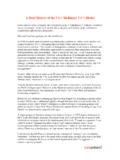Transcription of 1879—1955 - National Academy of Sciences
1 N a t i o n a l a c a d e m y o f s c i e n c e sAny opinions expressed in this memoir are those of the author(s)and do not necessarily reflect the views of the National Academy of l B e r t e i n s t e i n1879 1955A Biographical Memoir byJ o h n a r c h iB a l d Wh e e l e r Biographical MemoirCopyright 1980national Academy of sCienCeswashington EINSTEINM arch 14, 1879 April 18, 1955BY JOHN ARCHIBALD WHEELER* albert einstein was born in Ulm, Germany on March-**- 14, 1879. After education in Germany, Italy, and Swit-zerland, and professorships in Bern, Zurich, and Prague, hewas appointed Director of Kaiser Wilhelm Institute for Phy-sics in Berlin in 1914.
2 He became a professor in the School ofMathematics at the Institute for Advanced Study in Princetonbeginning the fall of 1933, became an American citizen in thesummer of 1936, and died in Princeton, New Jersey on April18, 1955. In the Berlin where in 1900 Max Planck discoveredthe quantum, einstein fifteen years later explained to us thatgravitation is not something foreign and mysterious actingthrough space, but a manifestation of space geometry came to understand that the universe does not go on fromeverlasting to everlasting, but begins with a big bang. Of allthe questions with which the great thinkers have occupiedthemselves in all lands and all centuries, none has everclaimed greater primacy than the origin of the universe, andno contributions to this issue ever made by any man anytimehave proved themselves richer in illuminating power thanthose that einstein 's 1915 geometrical and still standard theory of February 15, BIOGRAPHICAL MEMOIRS gravity provides a prototype unsurpassed even today forwhat a physical theory should be and do.
3 But for him it wasonly an outlying ridge in the arduous climb to a greater goalthat he never achieved. Scale the greatest Everest that thereis or ever can be, uncover the secret of existence that waswhat einstein struggled for with all the force of his the mountain peak magnetized his attention he toldus over and over. "Out yonder," he wrote, "lies this hugeworld, which exists independently of us human beings andwhich stands before us like a great, eternal riddle.."* Andagain, "The most incomprehensible thing about the world isthat it is comprehensible."t And yet again, "All of these en-deavors are based on the belief that existence should have acompletely harmonious structure.
4 Today we have lessground than ever before for allowing ourselves to be forcedaway from this wonderful belief." tWhen the climber laboring toward the Everest peakcomes to the summit of an intermediate ridge, he stops at thenew panorama of beauty for a new fix on the goal of his lifeand a new charting of the road ahead; but he knows that heis at the beginning, not at the end of his travail. What Einsteindid in spacetime physics, in statistical mechanics, and inquantum physics, he viewed as such intermediate ridges, suchway stations, such panoramic points for planning furtheradvance, not as achievements in themselves.
5 Those way sta-tions were not his goals. They were not even preplannedmeans to his goal. They were catch-as-catch-can means to who know physicists and mountaineers know thetraits they have in common: a "dream-and-drive" spirit, a*A. einstein , "Autobiographical Notes," in einstein : Philosopher-Scientist, ed. P. (Evanston, 111.: Library of Living Philosophers, 1949), p. Hoffmann, albert einstein : Creator and Rebel (New York: Viking, 1972), p. A. einstein , Essays in Science (New York: Philosophical Library, 1934), p. einstein 99bulldog tenacity of purpose, and an openness to try any routeto the summit.
6 Who does not know einstein 's definition of ascientist as "an unscrupulous opportunist;"* or his words onanother occasion, "But the years of anxious searching in thedark, with their intense longing, their alternations of confi-dence and exhaustion, and the final emergence into thelight only those who have experienced it can understandthat." f For such a man there are not goals. There is only thegoal, that distant was this climber? How did he come to be bewitchedby the mountain? Where did he learn to climb so well? Whowere his companions? What were some of his adventures?And how far did he get?I first saw and heard einstein in the fall of 1933, shortlyafter he had come to Princeton to take up his long-termresidence there.
7 It was a small, quiet, unpublicized field theory was to be the topic, it became clear, whenEinstein entered the room and began to speak. His English,though a little accented, was beautifully clear and slow. Hisdelivery was spontaneous and serious, with every now andthen a touch of humor. I was not familiar with his subject atthat time, but I could sense that he had his doubts about theparticular version of unified field theory he was then discus-sing. It was clear on this first encounter that einstein wasfollowing very much his own line, independent of the interestin nuclear physics then at high tide in the United was one extraordinary feature of einstein the manI glimpsed that day, and came to see ever more clearly eachtime I visited his house, climbed to his upstairs study, and weexplained to each other what we did not understand.
8 Over*A. einstein , "Reply to Criticisms," in einstein : Philosopher-Scientist, ed. P. (Evanston, 111.: Library of Living Philosophers, 1949), p. M. J. Klein, einstein , The Life and Times, R. W. Clark, book review, Science, 174 BIOGRAPHICAL MEMOIRSand above his warmth and considerateness, over and abovehis deep thoughtfulness, I came to see, he had a unique senseof the world of man and nature as one harmonious andsomeday understandable whole, with all of us feeling our wayforward through the darkness last time together came twenty-one years later, onApril 14, 1954, when einstein kindly accepted an invitation tospeak at my relativity seminar.
9 It was the last talk he evergave, almost exactly a year before his death. He not onlyreviewed how he looked at general relativity and how he hadcome to general relativity, he also spoke as strongly as ever ofhis discomfort with the probabilistic features that thequantum had brought into the description of nature. "Whena person such as a mouse observes the universe," he askedfeelingly, "does that change the state of the universe?"* Healso commented in the course of the seminar that the laws ofphysics should be simple. One of us asked, "But what if theyare not simple?" "Then I would not be interested in them," the einstein the boy became einstein the man is a storytold in more than one biography, but nowhere better than inEinstein's own sketch of his life, so well known as to precluderepetition here.
10 Who does not remember him in difficulty insecondary school, antagonized by his teacher's determinationto stuff knowledge down his throat, and in turn antagonizingthe teacher? Who that takes the fast train from Bern toZurich does not feel a lift of the heart as he flashes throughthe little town of Aarau? There, we recall, einstein was sentto a special school because he could not get along in theordinary school. There, guided by a wise and kind teacher,*J. A. Wheeler, "Mercer Street and Other Memories," in albert einstein , HisInfluence on Physics, Philosophy, and Politics, ed. P. C. Aichelburg and R. U. Sexl(Braunscheig: Vieweg, 1979), p.







